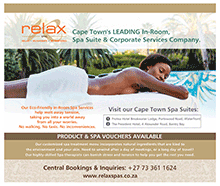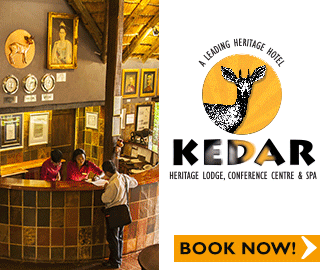

Luxury Travel: Shaping the future of Tourism in Africa
BY NICOLE LESCHINSKY | 26 JUNE 2017 03:42
In the traditional sense of the word, luxury has always meant status, which was characterised by possessing material objects. As global consumers have become more affluent and are spending more on luxury brands, masses of people have suddenly attained the same things, which create a perception of it being less exclusive.
Today, luxury has become intangible. It is subjective. Luxury means something different to each unique customer, and each customer will have different views on what luxury travel means to them. One guest may love to have their favourite range of Hermès bath products in their en suite washroom, another may wish for music to play via underwater speaker systems as they swim in the pool. Another may define luxury as having all the time in the world to spend with their loved ones. Past definitions and cost can no longer be used to identify luxury. Luxury is what the customer wants it to be.
In Africa’s developing economies, the growing middle class markets are expected to begin to spend on experiential options rather than material items, similar to global mature market trends. Today, luxury consumers are focused on self-actualisation, and expect brands to connect with them on a personal level. Therein lies opportunities for the luxury market to proactively offer a guest what they want, before they have even asked for it.
Emily Segal, co-founder of K-Hole explains, “We’re living in an age where civilians can travel to outer space on Virgin Galactic. Where you can rent a private island on Airbnb for US $500 a night. It’s become clear that mass luxury is no longer a new thing, yet it creates this contradiction: how can you offer ‘luxury’ in the traditional sense and ‘mass’ at the same time?”
To stay competitive, brands will need to introduce smarter ways of connecting with customers. The new era of luxury travellers will expect an experience when dealing with a brand, something that makes them feel it was designed with them in mind. Customers do not want to feel their experience is a ‘mass offering,’ but rather one which was tailor-made to their unique preferences. The industry will need to adapt to surpass customer expectations with a rewarding experience. Luxury travel brands will have to anticipate and satisfy customers’ needs and desires in an original way before the customer has even set foot on the property.
At the rate the modern world is evolving, brands need to continuously push innovation, or be left behind. Luxury hotels in Africa are on par with international standards of excellence, and offer incredible experiences at some of the most exquisite settings on the planet, but some may fall behind in evolving with new consumer behaviours and purchasing patterns. For example, most luxury establishments offer uninterrupted connectivity. Globe-trotting consumers expect to be connected to the world 24-7 and some destinations in remote spots of Africa cannot provide reliable technology. This is particularly notable for business travellers - the biggest market of travellers globally. It is of vital importance to ensure every element of the brand is consistent along the journey.
Xavier Lagardère, Head of Distribution for Lufthansa explains, “The motto for first class is that you should expect the exceptional. It takes a lot of consistent investment to build that ultimate experience into the product. Before your travel, you will have been in touch with our dedicated services, and everything is tailored towards your details. When departing, you get to the exclusive facilities of the dedicated first class terminal. You are taken to your aircraft by our chauffeured limousine service. The on-the-ground time and the flight constitute a single experience.”
Africa’s growing economies suggests there is a huge demand for luxury hotels, particularly those catering to business travellers, and many global luxury brands have already launched in commercial districts and popular leisure areas. The Carlson Rezidor Hotel Group, which owns the brands Radisson Blu and Park Inn, have expanded to 29 countries in Africa. The group plans to complete the number of hotels in Nigeria to 15 by the end of 2020. Despite Nigeria’s economy being on a downturn, it is the Carlson Rezidor Hotel Group’s second biggest market on the continent after South Africa. In South Africa, the group plans to expand its hotels from 14 to 20 during the same period. Other potential investment areas are Kenya, Tanzania, Mozambique, Rwanda, Angola, Ghana, Uganda, Algeria and Ethiopia. The group’s aim is to have a hotel in commercial districts of each economic region’s market to accommodate business travellers.
Another luxury group considering to enter the African market is Jumeirah, famous for its luxe hotels in Dubai. The group is looking for cities that will uphold the brand standard. Having already committed to developments in Egypt and Morocco, it has its sights on South Africa, Mauritius and the Seychelles. These three markets were ranked by the World Bank for being the top destinations in Africa in terms of competitiveness in tourism and travel. Piers Schreiber, VP of public affairs noted, “If you look at the luxury five-star market - which is a niche market - you have to wait for the right hotel, because if you make the wrong choice it’s going to reflect badly on your brand in other markets.
“We won’t offer four-stars. It will always have to be five-star luxury because that is what our existing community of guests expect. If they have come to Dubai or have gone to London, Frankfurt or Shanghai, and had a certain experience of Jumeirah, they are going to expect that to be replicated in the different markets in which we operate.” Schreiber added.

Nigeria - Africa’s largest economy - has the highest growth in hotel investment with 51 new hotel development plans, more than the entire pipeline in Central Africa and East Africa combined. Morocco follows with 31 hotels, then Egypt with 18 new establishments.
The fact that global brands such as Four Seasons have launched in African countries is attracting other large investors. Hotel group Marriott has 36 hotels planned for Africa, and Hilton, Starwood Westin and Sheraton and Mangalis all have projects in the pipeline. Nigeria - Africa’s largest economy - has the highest growth in hotel investment with 51 new hotel development plans, more than the entire pipeline in Central Africa and East Africa combined. Morocco follows with 31 hotels, then Egypt with 18 new establishments. The hotel development pipeline for the 49 countries in sub-Saharan Africa is growing much faster than the North African region.
When launching a luxury travel brand in Africa, it is vital to understand the culture and community the brand will be entering into in order to position it correctly in the market. Specific platforms aimed at connecting affluent customers to luxury brands are making waves and allowing for relevant partnerships to be formed at various social occasions, making for personal interactions. One example is the Luxuria Lifestyle platform, aiming at connecting the biggest brands and affluent consumers in Africa’s luxury industry. Patrick Madendjian, marketing manager for the RGBC Moet Hennessy Group believes the success of Moet Hennessy in the African market was by adapting the brand to local markets.
Madendjian revealed, “We don’t impose international trends on a new market - we see how our product can adapt to a local market and culture. We talk about African markets, not Africa as a whole, as each market is unique. In South Africa, for example, the relevance for Hennessy was the connection to the music culture. The Moet Hennessy house is deeply rooted in history, we search for ways that customers can identify and interact with the brand.
“We are not influenced by market trends, these change quickly and our products take a long time to produce, therefore we define the spaces we want to play in. As long as consumers recognise interactions are true to that brand the customer will be happy to actively engage with it.” Madendjian added.
Furthermore, he noted that remaining exclusive should not be a concern in the luxury market, regardless of the industry, as all the luxury houses have ranges that are extremely rare and exclusive. “Today the word ‘luxury’ isn’t about exclusivity, but rather inclusive – what emotions can you trigger in a consumer? You want to trigger desirability and aspirations, to help the consumer aspire to a better life and have a better image of him/herself. Create a brand they see themselves associating with, so that they want to buy into it.”
According to Amadeus, the next generation of luxury travellers from any regional market fall into a ‘Hierarchy of Travel Needs,’ and can be segmented into three ‘tribes’ depending on their travel patterns. It is a theory similar to Maslow’s hierarchy of needs, depicting the five basic ‘needs’ humans aspire to fulfil. After achieving one level, we are driven to achieve the next, and so on. The more exposed, or accustomed a traveller is to luxury travel, the more they will expect in order for their needs to be fulfilled.
The traveller tribes are segmented into ‘Reward Hunters,’ ‘Simplicity Searchers’ and ‘Obligation Meeters.’ Reward Hunters are driven by self-indulgent travel, combining self-improvement and health-focused luxury experiences to reward themselves for their achievements in life. In contrast, a Simplicity Searcher is motivated by the most streamlined, and efficient travel arrangements being made on their behalf by trusted outsourced individuals. Finally, Obligation Meeters have a very specific objective to their travel plans, one that is the primary reason for their travel but may include luxury activities.
Not only does luxury mean something different to each person, but each person’s perception of luxury will change at any given time during their lifetime. Luxury travel brands will need to pin-point exactly what is important to their guests at an exact moment in time. A traveller’s perception may change based on their experience with a brand at a particular moment, and the new era of luxury travel brands will need to constantly monitor these expectations.
The Amadeus report further splits future luxury travellers into spending patterns and varying degrees of wealth. The categories determine that 31% of luxury travellers spend on ‘Bluxury,’ 24% are ‘Cash-rich but Time-poor,’ 20% are ‘Special Occasion’ travellers, 18% are ‘Strictly Opulent,’ 4% are ‘Always Luxury’ and 3% are ‘Independent and affluent.’
A term coined for those combining business travel with luxury leisure travel is ‘Bluxury,’ the category holding the largest percentage of travellers. A blend of Obligation Meeters with Reward Hunters, this group includes those in senior positions with the authority to allow for extra days in their travel plans to complete their business objectives and then reward themselves with leisure time, usually extended by 24 or 48 hours. These travellers will seek expert advice tailored to their individual plans to make the most of their limited stay wisely. Luxury travel brands can benefit by understanding this type of travellers needs and accommodating with last-minute bookings, suggestions and city-tours or by obtaining exclusive tickets to events taking place at the time.
The ‘Cash-rich but Time-poor’ category are a blend of Obligation Meeters and Simplicity Searchers, often fitting travel into busy schedules and making last-minute plans. Flexibility is key for this group, who often outsource travel plans in the search of their ultimate private escape from the hectic pace of life or to spend precious time with loved ones.
‘Special Occasion’ travellers see luxury travel as a treat, and will frequently search for the best options available to them, either with upgrades through loyalty points or finding a remarkable one-of-a-kind experience. These Reward Hunters enjoy fine dining and spa indulgences, but despite their affluence, they are willing to sacrifice general travel comfort if it means the end-result will be a journey of a lifetime. They may change their travel plans as they go along to suit their budget. They are more likely to be open to suggestions and make less assumptions, leaving more potential for a brand to exceed their expectations.
In comparison to the ‘Always Luxury,’ this tribe’s budget is more limited and therefore brands planning special occasions will need to impress. They are less likely to be repeat travellers, therefore less is known about their end-to-end expectations. These travellers are the most difficult to make assumptions about based on being new, infrequent guests who are open to recommendations. It is also difficult to create an end-to-end luxury experience for them, when they may combine affordable options with luxe ones, leaving room for disappointment along the way.
The 18% of travellers that are ‘Strictly Opulent’ will travel to only the best and most glamorous destinations. These Reward Hunters will consult luxury travel influencers for advice and a large priority of their trip is to share their experience on social media, to be seen living the good life. This group will include friends of similar wealth in their travel plans and book extravagant group activities.
‘Always Luxury’ traveller tribes are Simplicity Searchers, where luxury is everyday life and money is no object. Luxury lifestyle and travel is a requirement to which they are accustomed to, and must be as discreet, comfortable and as streamlined a process as possible. They fly by private jet or first-class and expect the best of the best. This group will outsource all their travel requirements to a trusted source, and unlike other traveller tribes, this group does not blend with any other tribe and does not change their travel intentions nor their travel habits. These travellers do not require guidance at luxe hotels, they know what they want and expect an end-to-end luxury experience. With very specific needs, there are higher chances of disappointing this client, who are likely to be well-known and repeat travellers with their trusted brands.
The smallest percentage of luxury travel tribes are the ‘Independent but Affluent,’ those who have little to no obligations tying them down in life, and travel as and when they want to be pampered or try a new experience. They will often travel alone or with select friends, and may seek luxury travel destinations marketed to solo travellers to meet new friends. A blend of Reward Hunters and Simplicity Searchers, they are free to please only themselves in their journeys, and will expect their travel provider to make appropriate choices in travel brands and destinations.
Conrad Algarve Hotel’s Joachim Hartl suggests, “You need to be able to listen and read between the lines throughout a customer’s trip and communicate that extremely fast within your team.
“You need a very good Customer Relationship Management (CRM) system, and it needs to be constantly fed. We have engineers and housekeepers going into the hotel rooms who have received special training, so that they can scan the room and make observations. If they see, for example, that somebody has running shoes, we’ll leave them extra bottles of water. They then feed it back to the CRM. You pick up on habits and can proactively forecast what the guest might want, without them expressing it. If you manage this two or three times throughout their stay, they will leave saying ‘this is exceptional’,” Hartl adds.
Many luxury travel brands are thriving through successful collaboration. The industry platforms that are available create opportunities for clients to book multiple experiences. Soon technology will be available that connects suppliers from the point of booking to the point the guest arrives home, and every moment between. By using this data, service providers can mitigate problems from snow-balling along the journey to ensure it is as seamless as possible. By gathering so much personal data about guests, future luxury brands will pair with data security companies to protect client’s valuable information. These combination offerings allow for unique experiences and convenience when booking everything at once. The whole industry will benefit from collaboration from various sectors: Hotels; airlines; wellness brands; technology providers; tour and service providers, to create an end-to-end luxury journey.
The new era of future traveller comparisons will be useful for luxury brands to tailor-make their offerings according to the type of visitor they receive, and personalise experiences around very different requirements. Affluent travellers will expect to feel that brands understand their needs and preferences.
As the tourism industry expands to meet the demands of the growing affluent market, travel brands will need to know their customers intimately and offer exclusive one-of-a-kind packages catering to each individual’s needs. Impeccable service, Michelin-star restaurants, luxurious suites, lavish facilities and breath-taking design are now standard features in luxe hotels. Unexpected details in the customers’ stay experience beyond the required norm is what will drive brand loyalty. Tomorrow’s luxury travellers will expect suppliers to adapt and communicate with other suppliers to ensure each individual guest has a unique journey, and this will shape the future of tourism in Africa.










